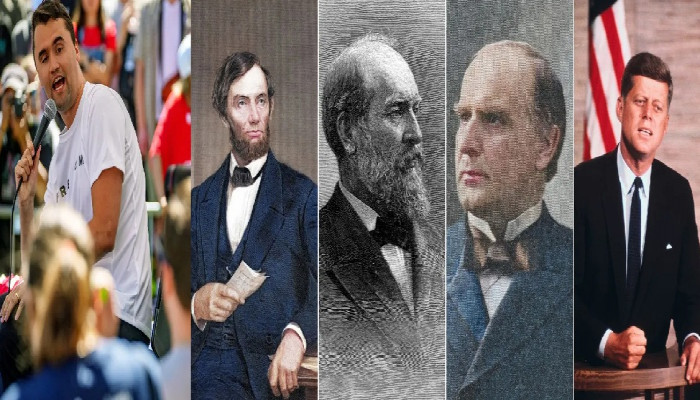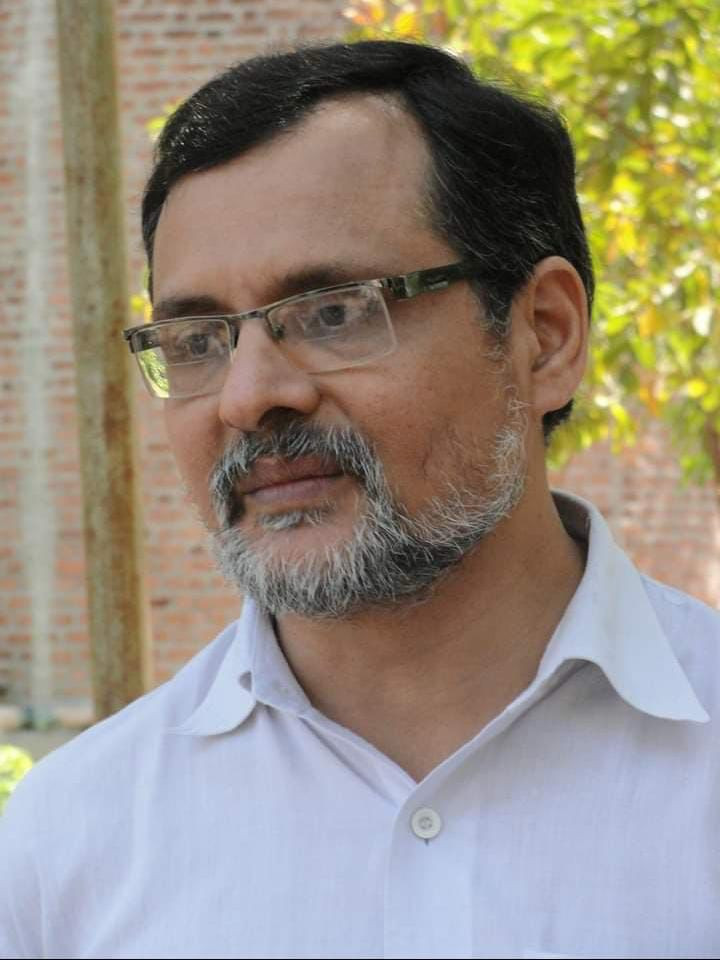Words That Kill: From Abraham Lincoln to Charlie Kirk-- How Woke Leftist Rhetoric Fuels Ruthless Political Assassinations in American Democracy
- In Current Affairs
- 12:21 PM, Sep 12, 2025
- Viren S Doshi
Overview
Once again 11th September anniversary turned into a grim reminder of the vulnerability of the American Dream with the heartbreaking collapse of Charlie Kirk on the stage that turned into an altar of freedom of speech, witnessing the supreme sacrifice of a promising young man in front of his family and kids on the day before, which is the 10th September. Ironically, the same Sunrise also draws spiritual strength from the ringing words of a Hindu Monk from the East, Swami Vivekananda, whose soothing words at the Chicago gathering still echo the message of unity, freedom and liberty that America is wedded to since its foundation.
American democracy, forged in the fires of revolution and debate, has endured as a beacon of free expression, yet it remains haunted not only by terrorist attacks but also by the shadows of political assassinations.
The dastardly acts of violence, spanning more than two centuries, reveal a recurring affliction: the transformation of words into weapons, where leftist hateful narrative incites lone actors or violent conspirators to silence dissent through bloodshed. From the earliest strikes against figures like David Ramsay in 1815 — a South Carolina physician, historian, and politician murdered by a mentally ill former patient he had examined for the court, marking the first known assassination of an American politician — to the recent killing of a popular conservative activist Charlie Kirk in 2025, assassinations have tested the republic's resilience, often reshaping its course amid eras of profound division.
Consider this stark arithmetic: four presidents slain out of forty-five unique individuals who have held the office, that is one in every eleven or so — a chilling ratio that underscores the peril embedded in the nation's highest office, even as some, like Franklin D. Roosevelt with his four terms, served multiple times, slightly diluting the per-individual odds but not the grim legacy.
This history, marked by the murders of Abraham Lincoln, James A. Garfield, William McKinley, and John F. Kennedy — and dozens more across state and local levels — illuminates how unchecked rhetoric, particularly from the woke left, has indoctrinated unstable minds, turning abstract hatred into reckless, lethal blows.
By tracing these tragedies, we uncover the patterns of indoctrination, the whispers of conspiracy, and the elusive pursuit of justice that continue to plague the nation's soul.
History of Bloodshed - Racial Divisive Forces weigh out the Unifying Nationalist Forces
The horrific tale begins in the 19th century, amid the raw fractures of a young union emerging as a promising nation. On April 14, 1865, just days after the end of the Civil War, President Abraham Lincoln fell at Ford's Theatre, struck down by John Wilkes Booth, a Confederate sympathiser whose rage against emancipation echoed the era's sectional venom. Booth's bullet not only claimed Lincoln's life but derailed Reconstruction, allowing resentments to fester into the Jim Crow South.
Sixteen years later, on July 2, 1881, President James A. Garfield met a similar fate in a Washington train station, shot by Charles Guiteau, a deranged office-seeker whose delusions of grandeur masked deeper frustrations with the spoils system — the patronage practice where winning political parties rewarded supporters with government jobs, often regardless of merit, which dominated U.S. politics until reforms like the Pendleton Act of 1883. Garfield lingered for months before succumbing to infection, his death spurring civil service reforms that sought to tame the patronage beast.
Then, in 1901, anarchist Leon Czolgosz, radicalised by leftist critiques of industrial tyranny, gunned down President William McKinley at the Pan-American Exposition in Buffalo. McKinley's assassination prompted the Secret Service's permanent role in presidential protection, a grim acknowledgement that democracy's guardians must wield guns as well as gavels.
The 20th century amplified these horrors, weaving assassinations into the fabric of social upheaval. In 1935, Louisiana Senator Huey Long, the fiery populist whose "Share Our Wealth" program terrified deep state elites, was slain in the state capitol by Carl Weiss, driven by personal vendettas intertwined with political rivalry. Long's death silenced a movement that might have upended the New Deal. The 1960s, a cauldron of civil rights and anti-war fervour, saw a torrent of violence: President John F. Kennedy was assassinated on November 22, 1963, in Dallas by Lee Harvey Oswald, a Marxist whose shots echoed global Cold War tensions, propelling the U.S. deeper into Vietnam.
Mere months later, on April 4, 1968, civil rights icon Martin Luther King Jr. was felled on a Memphis motel balcony by James Earl Ray, a racist whose act ignited urban riots and hastened the Fair Housing Act.
Just two months after, on June 5, 1968, Senator Robert F. Kennedy, Kennedy's brother and a beacon for the dispossessed, was assassinated in a Los Angeles hotel by Sirhan Sirhan, whose anti-Zionist rage stemmed from Kennedy's Israel support, derailing Kennedy’s nomination to the high office and deepening national despair.
Even as the century waned, the affliction persisted. On November 18, 1978, Representative Leo Ryan became the only sitting member of Congress to die by assassination, shot on a Guyana airstrip by gunmen from the Peoples Temple cult he was investigating. Ryan's probe into Jim Jones's socialist enclave preceded the Jonestown massacre, exposing how vicious ideologies could devour lives.
These killings, clustered in times of flux, illustrate a democracy under siege — from transnational leftist forces colluding with venomous, divisive domestic forces, where rhetoric sharpens the blade to cut apart the rising nationalists and the promising nation. And across the broader canvas, with perhaps forty or so political assassinations staining the ledger since the founding — state legislators, mayors, activists, and more — that is one every five to six years on average, a relentless, horrendous, deadly drumbeat that no democracy can ignore.
Current Ghastly Attacks
In the modern era, this violence has perpetuated and surged anew, striking at the heart of conservative voices amid hyper-partisan strife.
Former President Donald Trump survived harrowing attempts, the most brazen on July 13, 2024, in Butler, Pennsylvania, where a bullet grazed his ear, claiming a spectator's life before the shooter, Thomas Matthew Crookes, was neutralised. Another bid in 2025 echoed this peril, underscoring a climate where former leaders walk as targets.
And now, on September 10, 2025, Charlie Kirk, the 31-year-old founder of Turning Point USA and a relentless foe of “progressive orthodoxy”, was shot in the neck, literally killing “the free speech” during a speech at Utah Valley University. Firing from afar, the unidentified assailant fled into anonymity, leaving a manhunt in its wake.
President Trump decried it as a "political assassination," a direct outgrowth of the radical lunatic left's unyielding assault on conservative icons.
What is at the core of this heinous violence?
At the core of this plague lies the indoctrination of lone actors or conspirators through woke leftist rhetoric, a corrosive force that dehumanises opponents and justifies elimination. Woke rhetoric, originating in African American vernacular English as a call to "stay woke" — meaning to remain alert to racial injustice and systemic discrimination, as in early 20th-century protest songs warning of dangers like the Scottsboro Boys trials — has evolved into a broader “progressive” discourse emphasising identity politics, equity over equality, and critiques of structures like white privilege or systemic oppression.
Terms like "threat to democracy" and "fascist" lobbed freely as time bombs at Trump and Kirk by Democratic figures and media allies paint conservatives as existential evils, priming unstable minds for violent attacks.
Explicit calls for "elimination" have pierced the veil in 2024, Democratic strategists on social media urged "taking out" Trump to "save democracy," dismissing backlash by labelling the “criminal” calls as mere metaphor. “Progressive” activists in 2020 echoed this, advocating the removal of "deplorables" to thwart fascism, their words amplified across platforms into a chorus of incitement.
Kirk's killer, though unnamed, operated in this echo chamber, where wrongful but planned vilification of nationalist conservatives as "supremacists" or "globalist enablers" morphs into perceived “moral” imperative.
Historical echoes abound — McKinley's anarchist slayer absorbed leftist tracts decrying capitalist kings; Oswald's Marxism drew from Communism-inspired venom; even Sirhan's fury twisted around anti-imperialist narratives.
This rhetoric, propelled by leftists, liberals, and their woke vanguard, forges a pipeline from tweet to trigger, where lone wolves become unwitting executioners of “ideological purity”.
Whispers of a deeper machination, the "deep state" — a conspiracy theory positing a clandestine network of unelected bureaucrats, intelligence operatives, and Globalist elites who manipulate policy behind the scenes, often invoked to explain resistance to elected popular leaders like Trump — haunt these tales, fuelling theories of orchestration from the shadows.
Kennedy's end, with its CIA frictions post-Bay of Pigs (Cuban Invasion), birthed enduring suspicions of agency complicity, bolstered by declassified surveillance files.
King's FBI tail under COINTELPRO—the Federal Bureau of Investigation's covert Counter-Intelligence Program from 1956 to 1971, which used illegal tactics like infiltration, disinformation, and harassment to disrupt civil rights groups — aimed at dismantling civil rights, lent credence to claims of a broader plot in Ray's conviction.
Ryan's cult probe irked intelligence watchers, while Kirk and Trump's incidents exposed lapses in security, fuelling speculation of institutional sabotage.
Evidence remains elusive; a fog of redacted memos and denied requests leaves the deep state as both bogeyman and blind spot in the quest for truth.
Farther afield, the spectre of CCP-occupied China looms in conspiracy theories' margins, accused of stoking U.S. discord through disinformation floods on social media, sowing seeds that bloom into violence.
While no fingerprints tie Beijing to Kirk's grave or McKinley's fall, the party's geopolitical calculus thrives on American paralysis, amplifying divides by widening faultlines that homegrown lone actors harvest and exploit.
What about Prosecutorial and Judicial Solutions? Whether that deter the crimes?
Justice, democracy's fragile sword, has cut unevenly through this history.
Booth perished in a manhunt, his co-conspirators hanged; Guiteau and Czolgosz swung from gallows; Ray rotted in prison, Sirhan languishes denied parole. Weiss fell in the fray, the Peoples Temple killers in a mass suicide. Yet Oswald's slaying by Jack Ruby, Ray's contested guilt, and Kirk's fugitive shooter mock closure, breeding cynicism where trials falter. Trump's assailant met swift death, foreclosing a courtroom reckoning, a pattern where vengeance outpaces verdict.
Charlie Kirk's blood, spilt on September 10, 2025, stains a lineage from Ramsay's forgotten grave to Kennedy's eternal flame, a chronicle of democracy's dark underbelly.
Woke leftist rhetoric, with its calls to excise opponents, has weaponised words into this affliction, indoctrinating the fringe to enforce silence by force.
Conclusion
As the shooter evades capture, the nation confronts an imperative: dismantle the vitriol that births assassins - this is clearly not freedom of speech but blatant misuse of freedom of speech - let there be no confusion or delusion - lest the republic's voice be forever stilled. In reclaiming discourse from division, America might yet forge a bulwark against the next shadow.
Disclaimer: The opinions expressed within this article are the personal opinions of the author. MyIndMakers is not responsible for the accuracy, completeness, suitability, or validity of any information on this article. All information is provided on an as-is basis. The information, facts or opinions appearing in the article do not reflect the views of MyindMakers and it does not assume any responsibility or liability for the same.







Comments